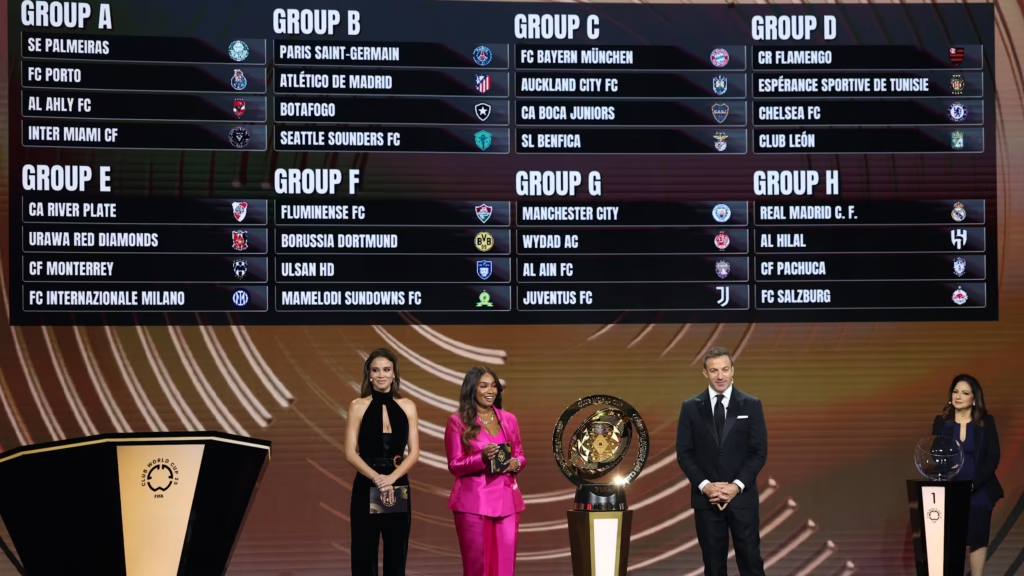The FIFA Club World Cup 2025, hosted in the USA from June 14 to July 13, featured 32 elite teams competing for a $1 billion prize pool. Club valuations, driven by revenue from broadcast deals, sponsorships, and matchday earnings, highlight the financial disparity between European giants and non-European contenders.
This article explores the valuations and squad values of key teams like Real Madrid, Chelsea, and Fluminense, offering insights into their financial power and opportunities for sports-tech startups to innovate with YTC Ventures.
Valuations of Top FIFA Club World Cup 2025 Teams
Club valuations reflect enterprise value (equity plus net debt), based on Forbes, Sportico, and Deloitte’s Football Money League 2025. Squad values, sourced from Transfermarkt, indicate player market worth. Below are the valuations for prominent teams in the 2025 tournament.

- Real Madrid (Spain)
- Club Valuation: $6.75 billion (Forbes, 2025)
- Revenue (2023–24): $1.129 billion, the first football club to surpass $1 billion annually.
- Squad Value: €1.3 billion ($1.5 billion)
- Key Drivers: The revamped Santiago Bernabéu Stadium doubled matchday revenue to $268 million, with UEFA Champions League prize money ($154 million) and sponsorships boosting financials. Real Madrid’s global brand and five Club World Cup titles cement their dominance.
- Chelsea (England)
- Club Valuation: $3.1 billion (Forbes, 2024)
- Revenue (2023–24): ~$645 million (Deloitte estimate).
- Squad Value: €1.22 billion ($1.3 billion)
- Key Drivers: Premier League broadcast deals, sponsorships (e.g., Nike), and $1 billion+ transfer spending since 2022 (e.g., João Pedro, £60 million) fuel Chelsea’s value. Their 2025 semifinal win over Fluminense underscores their competitive edge.
- Paris Saint-Germain (PSG, France)
- Club Valuation: $4.5 billion (Sportico, 2025)
- Revenue (2023–24): $739 million.
- Squad Value: €1.12 billion ($1.3 billion)
- Key Drivers: Qatari ownership, high-profile signings, and commercial deals drive PSG’s value. Their 2024 UEFA Champions League win and 2025 Club World Cup final appearance enhance their financial standing.
- Bayern Munich (Germany)
- Club Valuation: $4.8 billion (Sportico, 2025)
- Revenue (2023–24): $744 million, with $455 million from commercial deals (e.g., Adidas, Allianz).
- Squad Value: €892 million ($1 billion)
- Key Drivers: Bundesliga dominance and Champions League success, combined with robust sponsorships, make Bayern a financial powerhouse.
- Fluminense (Brazil)
- Club Valuation: $150–200 million (estimated, based on regional trends and 2023 Copa Libertadores win).
- Revenue (2023–24): $50–70 million, from Maracanã matchday earnings, TV rights, and player sales (e.g., João Pedro, £60 million).
- Squad Value: €86.15 million ($94 million)
- Key Drivers: As a leading Brazilian club, Fluminense’s valuation is modest but significant in South America, bolstered by their passionate fanbase and Thiago Silva’s leadership.
- Palmeiras (Brazil)
- Club Valuation: $200–300 million (estimated, based on regional peers).
- Revenue (2023–24): $60–80 million.
- Squad Value: €252.6 million ($292.5 million)
- Key Drivers: Domestic success and player transfers support Palmeiras’ financial growth, though they trail European clubs.
- Flamengo (Brazil)
- Club Valuation: $200–250 million (estimated).
- Revenue (2023–24): $70–90 million, from Copa do Brasil and Supercopa wins.
- Squad Value: €196 million ($214 million)
- Key Drivers: Recent signings (e.g., Jorginho) and domestic titles enhance Flamengo’s market position.
- Al-Hilal (Saudi Arabia)
- Club Valuation: $300–400 million (estimated, based on Saudi Pro League investments).
- Revenue (2023–24): $100–150 million, driven by state-backed sponsorships.
- Squad Value: €159.43 million ($174 million)
- Key Drivers: Al-Hilal’s upset win over Manchester City in 2025 and stars like João Cancelo and Rúben Neves elevate their global profile.
- Borussia Dortmund (Germany)
- Club Valuation: $2.1 billion (Sportico, 2025)
- Revenue (2023–24): ~$400 million.
- Squad Value: €485.1 million ($530 million)
- Key Drivers: A late-season turnaround under coach Niko Kovac and strong Bundesliga performances support Dortmund’s valuation.
- Inter Miami (USA)
- Club Valuation: $1 billion (CNBC, 2025)
- Revenue (2023–24): ~$200 million, boosted by Lionel Messi’s star power.
- Squad Value: €66.2 million ($76.6 million)
- Key Drivers: Messi’s presence and MLS growth drive commercial success, despite a modest squad value compared to European clubs.
Real Madrid Club Valuation: $6.75 billion (Forbes, 2025)
The revamped Santiago Bernabéu Stadium doubled matchday revenue to $268 million, with UEFA Champions League prize money ($154 million) and sponsorships boosting financials. Real Madrid’s global brand and five Club World Cup titles cement their dominance.

Other Notable Teams in FIFA Club World Cup 2025
- Auckland City (New Zealand):
- Squad Value: €4.6 million ($5.3 million), the lowest in the tournament.
- Club Valuation: Likely under $20 million, reflecting Oceania’s smaller market.
- Notes: Their $4.6 million prize money from participation is transformative for the amateur club.
- Los Angeles FC (USA):
- Club Valuation: $1.25 billion (Forbes, 2025)
- Squad Value: €46 million ($53.3 million)
- Notes: MLS’s growing popularity and a playoff win over Club América secured their spot.
- Seattle Sounders (USA):
- Club Valuation: $800–900 million (estimated, based on MLS averages).
- Squad Value: €51.8 million ($60 million)
- Notes: A competitive MLS side with a strong regional fanbase.
- Manchester City (England):
- Club Valuation: $5.3 billion (Forbes, 2025)
- Squad Value: €1.3 billion ($1.5 billion)
- Notes: Despite their defending champion status, an upset loss to Al-Hilal highlighted vulnerabilities.
- Other Clubs (e.g., Wydad, Ulsan):
- Limited valuation data; squad values range from $20–100 million, with club valuations likely under $200 million due to smaller domestic markets.

Financial Insights and Prize Money Impact
- European Dominance: The top 11 squads by value are European, with Real Madrid, Manchester City, PSG, Chelsea, and Bayern Munich exceeding $1 billion in squad value. This reflects their advantage in broadcast and commercial revenue, with Europe’s clubs earning $12.81–38.19 million just for participation.
- Non-European Clubs: Brazilian teams like Palmeiras ($292.5 million squad value) and Fluminense ($94 million) lead non-European squads but lag far behind European valuations.
- Prize Money: The $1 billion prize pool significantly impacts smaller clubs. For example, Auckland City’s $4.6 million participation fee equals 61 OFC Champions League wins, while the tournament winner can earn up to $125.8 million.
- Revenue Trends: European clubs average a 5.1x revenue multiple, lower than NFL (9x) or NBA (11.7x), due to debt, ownership restrictions, and stadium challenges.

Opportunities for Sports-Tech Startups / Investors with YTC Ventures
The global football market, projected to reach $4.71 billion by 2033, offers immense opportunities for sports-tech startups. Innovations in AI-driven scouting, fan engagement platforms, and performance analytics can transform clubs’ operations and fan experiences. YTC Ventures, supports such startups through investment banking and deal-matching services. To apply:
- Visit www.ytcventures.com.
- Submit a pitch deck to investments@ytcventures.com, detailing your startup’s innovation, market fit, and financials.
- Undergo due diligence for funding and strategic support.
Investors can send e-mail to kks@ytcventures.com or Whats App “SPORTSINVEST” to +91-9380376419
Startups leveraging AI for player analytics or fan engagement apps are ideal candidates for YTC’s portfolio, aligning with the financial growth of clubs like Real Madrid and Chelsea.
Conclusion
The FIFA Club World Cup 2025 highlights a financial divide, with European giants like Real Madrid ($6.75 billion) and Chelsea ($3.1 billion) dwarfing South American teams like Fluminense ($150–200 million). Squad values, such as Real Madrid’s €1.3 billion versus Auckland City’s €4.6 million, underscore this gap.
The $1 billion prize pool offers transformative earnings, especially for smaller clubs. Sports-tech startups can capitalize on this dynamic market by partnering with YTC Ventures to drive innovation in football’s future.

Comments